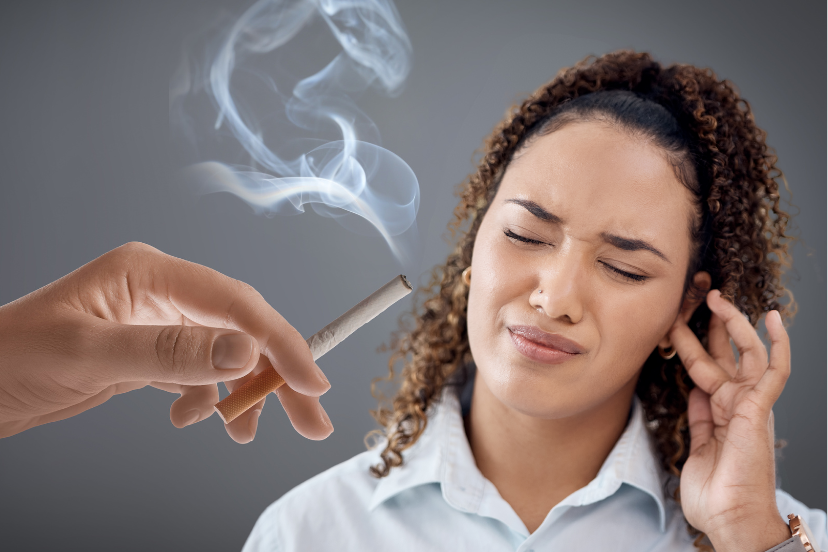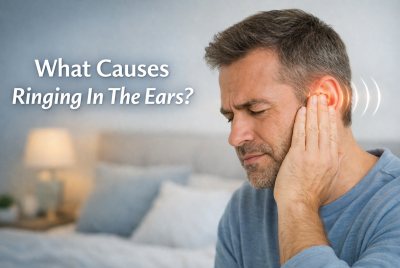Nicotine Tinnitus Risk Factor: How Smoking and Vaping Affect Ear Ringing
The Overlooked Link Between Nicotine and Tinnitus
If you live with ringing in the ears, buzzing, whooshing, or a high-pitched noise that won’t stop, you’re not alone. Many people notice tinnitus feels worse after certain habits — especially smoking or vaping. That raises an important question: Is nicotine a tinnitus risk factor? And if so, can quitting help reduce constant ear ringing or buzzing sounds over time?
In this guide, you’ll learn how nicotine may affect the inner ear and nervous system, what symptom patterns are common, what improvement timelines often look like after quitting, and practical steps that can protect hearing while you work on reducing nicotine exposure.
Quick Answer
Yes, nicotine can be a tinnitus risk factor because it can reduce blood flow to the inner ear and stimulate the nervous system, which may make tinnitus more noticeable or intense. Some people notice improvement after cutting back or quitting, although changes may take weeks to months, and results vary. If tinnitus is sudden, severe, or paired with hearing loss or dizziness, medical evaluation is important.
What Makes Nicotine A Tinnitus Risk Factor?
Nicotine is a stimulant that affects both cardiovascular function and the nervous system. Because the inner ear relies on steady circulation and stable nerve signaling, nicotine can contribute to tinnitus risk by influencing:
• Blood vessel narrowing that may reduce oxygen delivery to inner ear structures
• Nervous system stimulation that can increase sound sensitivity and signal “gain”
• Blood pressure changes that may stress delicate auditory structures
• Brain neurotransmitter activity that may affect how sound signals are processed
Nicotine is not the only tinnitus trigger, but it can be one factor that worsens symptoms in people who are already prone to tinnitus.
What This Often Feels Like In Real Life
Many people describe patterns such as:
• Ringing becomes louder shortly after smoking or vaping
• Buzzing feels stronger during stress or nicotine cravings
• Symptoms spike at night when the body is tired and the environment is quiet
• Tinnitus feels worse after nicotine plus caffeine or alcohol
• Ear ringing increases during withdrawal, then settles gradually
Some people notice a “cycle”:
• Nicotine temporarily feels calming
• Stress relief fades
• Nervous system arousal increases
• Tinnitus becomes more noticeable
• Sleep quality drops, which can further increase tinnitus awareness
These patterns can be helpful clues when tracking whether nicotine is affecting tinnitus intensity.
Self Check: Is Nicotine Likely Affecting Your Tinnitus?
Nicotine may be contributing if:
• Tinnitus spikes within minutes to hours after nicotine use
• Symptoms are worse on heavy smoking or vaping days
• Tinnitus is worse with nicotine plus caffeine or alcohol
• Sleep is disrupted after evening nicotine use
• Symptoms improve slightly on low nicotine days
Nicotine may be less likely to be the main factor if:
• Tinnitus is stable regardless of nicotine timing
• Tinnitus started after loud noise exposure or illness and never fluctuates
• You have a clear hearing loss progression unrelated to nicotine patterns
Does Nicotine Make Ear Ringing Worse?
Many people report that nicotine makes tinnitus more noticeable. One reason is that nicotine can increase alertness and nervous system activation, which may increase awareness of internal sound signals.
Nicotine may:
• Increase tinnitus intensity
• Trigger buzzing or high-pitched tones
• Make nighttime tinnitus harder to ignore
• Worsen stress and sleep patterns that influence tinnitus perception
Even if nicotine is not the root cause, it may still raise the “volume” of tinnitus perception.
Nicotine And Ear Buzzing: Why It Can Happen
Tinnitus is strongly linked to nerve signaling and brain sound processing. When auditory pathways become more reactive, the brain may interpret irregular nerve firing as buzzing, ringing, or humming.
Nicotine may contribute by:
• Increasing nervous system excitability
• Affecting neurotransmitters involved in sensory processing
• Increasing stress hormone activity
• Reducing sleep quality, which weakens sound filtering
This is one reason some people notice buzzing is worse during nicotine withdrawal, stress periods, or after using nicotine late in the day.
Why The Nervous System Can Amplify Tinnitus With Nicotine
The brain filters sensory input all day. When the nervous system is overstimulated, tinnitus can feel louder even without a change in hearing damage.
Nicotine may contribute to amplification by:
• Increasing alertness and arousal
• Raising anxiety or restlessness in sensitive individuals
• Increasing muscle tension in the jaw and neck
• Disrupting sleep quality and recovery
This can create a feedback loop where tinnitus increases stress, and stress increases tinnitus awareness.
Can Quitting Nicotine Reduce Constant Ear Ringing?
Quitting nicotine may help some people reduce tinnitus intensity, especially if nicotine was a clear trigger. However, quitting does not guarantee tinnitus will disappear.
Potential benefits of reducing or quitting nicotine include:
• Improved circulation to auditory structures
• Reduced nervous system stimulation over time
• Better sleep quality and reduced nighttime awareness
• Reduced stress reactivity once withdrawal stabilizes
Improvement may be gradual. It is common for tinnitus perception to fluctuate during the quitting process.
Typical Improvement Timeline After Reducing Or Quitting Nicotine
First 1–3 Weeks
• Withdrawal may temporarily increase tinnitus awareness
• Sleep disruption and stress may increase ringing perception
Weeks 4–8
• Many people notice improved sleep and a calmer nervous system baseline
• Tinnitus spikes may occur less frequently
Months 2–3 And Beyond
• Some people report a gradual reduction in intensity
• Others notice tinnitus is still present but less intrusive
Results vary based on hearing status, stress levels, and other triggers.
Smoking Vs Vaping: Does It Matter For Tinnitus?
Many people switch to vaping, believing it is safer. For tinnitus, the key issue is that nicotine remains active, even if exposure to some smoke toxins is reduced.
Smoking may add additional risks due to:
• Smoke-related toxins
• Increased inflammation
• Reduced oxygen delivery over time
Vaping may still contribute to tinnitus because:
• Nicotine can still narrow blood vessels
• Nicotine still stimulates auditory pathways
• Some people react to additives or airway irritation
If tinnitus is a concern, reducing nicotine exposure is usually more relevant than the delivery method.
Nicotine Patches And Gum: Can They Still Affect Tinnitus?
Nicotine replacement therapy may help quitting smoking, but it still introduces nicotine into the body. Some people notice tinnitus remains elevated while using patches or gum.
Useful considerations:
• Nicotine replacement may reduce exposure to smoke toxins
• It may still maintain nervous system stimulation
• Some people do better with gradual tapering strategies
If tinnitus worsens during nicotine replacement use, discussing alternatives with a healthcare provider is reasonable.
Comparison: Nicotine-Related Tinnitus Vs Other Common Triggers
Nicotine-Related Tinnitus Pattern
• Spikes after use or withdrawal periods
• Often linked to stress and sleep
• May improve with reduction over time
Noise Exposure Tinnitus Pattern
• Often follows a loud event
• May be constant or long-lasting
• Less tied to nicotine timing
Illness Or Congestion Related Tinnitus Pattern
• Often linked to ear pressure
• May improve as illness resolves
• Often paired with fullness or muffled hearing
This comparison helps many people identify whether nicotine is a main driver or a secondary amplifier.
Practical Tips To Reduce Nicotine’s Impact On Tinnitus
Cut Back Gradually If Needed
Some people find that quitting suddenly increases stress and worsens tinnitus temporarily. Gradual reduction can help reduce withdrawal spikes.
Avoid Nicotine Close To Bedtime
Nicotine can disturb sleep and increase nighttime tinnitus awareness. Earlier use may reduce sleep disruption.
Support Hydration
Hydration supports circulation and overall nervous system regulation.
Reduce Nervous System Overload
• Deep breathing
• Meditation
• Progressive muscle relaxation
• Gentle walking
These strategies can reduce stress-tinnitus amplification during quitting.
Exercise For Circulation
Regular movement supports circulation and helps regulate stress hormones.
Limit Alcohol And Caffeine If You Notice Spikes
Nicotine plus caffeine or alcohol can overstimulate the nervous system and worsen tinnitus for some people.
Use Sound Therapy At Night
• Fan or white noise machine
• Soft background audio
• Tinnitus masking apps
This can reduce the silence effect that makes tinnitus feel louder.
When Monitoring At Home Is Reasonable
• Tinnitus is stable, and you notice predictable spikes with nicotine
• No hearing loss or dizziness
• Symptoms improve with sleep and stress management
• You are working on cutting back gradually
When Medical Evaluation Is Important
• Sudden severe tinnitus
• New hearing loss
• Dizziness or balance symptoms
• Ear pain, pressure, or drainage
• One-sided tinnitus that persists
• Tinnitus that significantly disrupts sleep or daily function
An ENT or audiologist can evaluate hearing status and help rule out other causes that may be missed if tinnitus is blamed only on nicotine.
Tinnitus Management Options If You Still Use Nicotine
Even before quitting fully, symptom support can help:
• White noise or sound masking
• Sound therapy programs
• Hearing aids with tinnitus features if hearing loss is present
• CBT strategies to reduce distress response
• Sleep hygiene routines to reduce nighttime awareness
These tools do not “cure” tinnitus but often reduce how disruptive it feels.
Expectation Vs Reality
Expectation:
Quitting nicotine will immediately make tinnitus disappear.
Reality:
Many people see gradual improvement over time, and some notice tinnitus remains but feels less intense and less intrusive. Withdrawal can temporarily increase tinnitus awareness before the nervous system stabilizes.
FAQs On Nicotine And Tinnitus
Does Nicotine Make Ear Ringing Worse?
For many people, yes. Nicotine can reduce circulation and stimulate the nervous system, which may increase tinnitus awareness.
Can Quitting Nicotine Reduce Constant Ear Ringing?
It may help reduce intensity in some people, especially if nicotine was a clear trigger. Improvement often takes weeks to months.
Do Nicotine Patches Cause High Pitched Ear Noise?
Some people report tinnitus changes with nicotine replacement therapy. If symptoms worsen, consult a healthcare provider about alternative quit strategies.
Is Smoking A Risk Factor For Chronic Tinnitus?
Long-term smoking is linked to hearing health risks and may increase tinnitus risk due to vascular and inner ear effects.
Can Secondhand Smoke Affect Tinnitus?
Secondhand smoke may affect circulation and overall ear health. Avoiding exposure can be a helpful step for many people.
Final Takeaway: Breaking The Nicotine Tinnitus Cycle
Nicotine can be a tinnitus risk factor because it can reduce blood flow to the inner ear and overstimulate the nervous system, making ringing and buzzing more noticeable. Cutting back or quitting may reduce tinnitus intensity over time, but results vary, and improvement is often gradual.
If tinnitus is sudden, severe, or paired with hearing loss, dizziness, or one-sided symptoms, medical evaluation is important. Many people improve daily comfort by combining nicotine reduction with sound therapy, sleep support, and stress management strategies.
Disclaimer
This content is for informational purposes only and does not replace professional medical advice. Always consult a qualified healthcare provider before making changes to nicotine use, medications, or treatment strategies. Seek urgent medical attention for sudden hearing loss, severe dizziness, or severe symptoms.






